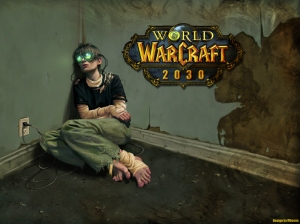
We have all heard of Elitist Jerks: They have no patience for wiping, they will tear your gear apart and critize your playing
style. I understand the importance for guilds to get bosses down for guild progression, But I find alot of younger players have no learned the basic human social skills before they jump into this boat. So here is some tips on how to play World of Warcraft with Social Skills:
First! What are Social
Skills: A social skill is any skill facilitating interaction and communication with others. Social rules and relations are created, communicated, and changed in verbal and nonverbal ways. The process of learning such skills is called socialization. The rationale for this type of an approach to treatment is that people meet a variety of social problems and can reduce the stress and punishment from the encounter as well as increase their
reinforcement by having the correct skills. In WoW, Social Skills would be use through Vent and Raid Chat.
Guild Social Skills
Five skills have been awarded special status as ‘Guild Social Skills’ due to the fact that these skills are essentail for management in orginizations. These five skills are the following:
•1)Delegation
•2)Conflict Management
•3)Employee Counselling
•4)Presentation Skills
•5)Dealing with diversity
Guild Leader Social Skills:
Here are a few basic attributes of a socially successful guild leader should have:
Confidence – They display confidence in themselves and successfully execute the projects they lead.
Friendliness – They are friendly to everyone, not to just a select few, displaying a genuine sense of care and concern for others.
Trustworthy – They can be depended upon both with personal exchanges and with responsiblities
Organized – Their organizational skills are second nature and displayed in all activities.
Self-control – They handle themselves well when emotional issues arise.
Acceptance – They extend love and forgiveness to everyone, even difficult people and those that differ from them.
Fun – They make life fun.
Space – They respect other’s privacy and choices.
Guild Member Social Skills:
Social skills are the skills we have to get along with other people. Often we take our social skills for granted, without realising all the complicated skills we use when we interact with others. Some of these skills are very basic and simple, like saying hello and good-bye, or smiling and making eye contact when we see someone we know. Others are more complex, like the skills we use to negotiate in a situation of conflict with somebody. Some people learn social skills easily and quickly, whereas others find social interactions more challenging, and may need to work on developing their social skills consciously.
Social skills are important for resiliency for a number of reasons. People with good social skills are naturally more popular than their less socially adept peers, which means they have better supports to call on when experiencing difficulties in their lives. Also, well-liked people get more social reinforcement (messages from other people that they are worthwhile and okay), so they tend to have better self-esteem, which can also help them through tough times.
Developing social skills
Social skills are like any other kind of skill – they can be learned. How do you know if you need to
improve your social skills? Ask yourself if you:
•Consider yourself a shy person.
•Wish that you had more friends but don’t know how to go about making them.
•Often feel uncomfortable with other people.
•Find it hard to know what to say sometimes.
•Think of yourself as a ‘loner’.
•Sometimes feel like there’s nobody to turn to when you need support.
If any of these things are true, then you may benefit from working on your social skills.
Basic social skills
The following is a list
of basic social skills. Can you identify any areas where you might be able to improve?
Basic interaction skills
These are the simple skills involved in conversing and interacting with others on an everyday basis.
They include:
•Smiling when greeting people and talking
•Basic politeness: saying please and thank-you, saying hello and good-bye, etc.
Making conversation: These are the skills you use when talking to other people. They include:
•Taking turns when talking
•Listening and showing interest in what the other person has to say
•”Small talk”: being able to chat about unimportant things
•Using humour
•Knowing when to disclose personal information and when not to
Building and maintaining friendships
There are many skills involved in making and sustaining friendships. For example:
•Approach skills: being able to go up and start talking to someone who you don’t know or don’t know well.
•Sharing decision making, i.e., not always insisting on having one’s way but negotiating about what to do, where to go, etc.
•Showing appropriate affection and appreciation.
•Maintaining contact, i.e., not expecting the other person to “do all the work” of keeping up the friendship.
•Being supportive, i.e., showing concern when your friend is having a hard time.
•Allowing distance and closeness. People need time apart as well as together.
•Thoughtfulness: “thinking ahead” about what might be a nice ting to do for your friend.
Empathy
Empathy means being able to put yourself into someone else’s shoes and recognising their feelings. It is not the same as sympathy or “feeling sorry for someone”. Empathy is responding in an understanding and caring way to what others are feeling. Empathic skills
include:
•Noticing other people’s feelings.
•Expressing concern at others’ distress.
•Being able to recognise what someone else might be feeling in a given situation.
•Showing sensitivity to others’ feelings when communicating. For example, being tactful when making critical comments (when criticism is necessary and/or appropriate).
Dealing with conflict
Social interactions do not always run smoothly. Conflict resolution skills include:•Assertiveness, or being able to say what you are feeling without being aggressive or getting personal. •Negotiation skills: being able to discuss a conflict calmly and rationally and come to an agreement about a solution.